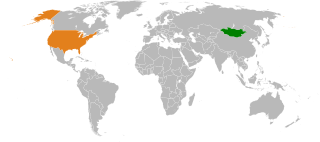Related Research Articles

Mongolia has diplomatic relations with all 192 UN states, the Holy See, the State of Palestine and the European Union.

Jack Foust Matlock Jr. is an American former ambassador, career Foreign Service Officer, teacher, historian, and linguist. He was a specialist in Soviet affairs during some of the most tumultuous years of the Cold War, and served as the U.S. ambassador to the Soviet Union from 1987 to 1991.

Bilateral relations between Mongolia and the United States formalized in 1987 with the establishment of diplomatic relations. Since then, the United States has become a key third neighbor to Mongolia, and in 2019 this relationship was upgraded to a strategic partnership. Ties focus on education, development assistance, and defense.

The Embassy of Ukraine in Moscow was the chief diplomatic mission of Ukraine in the Russian Federation. It was located at 18 Leontyevsky Lane in Moscow.

The Embassy of Mongolia in Moscow is the chief diplomatic mission of Mongolia in the Russian Federation. It is located at 11 Borisoglebsky Lane in Moscow. The current ambassador is U.Enkhtuvshin, who presented his credentials in September 2022.

Guinea-Bissau–Russia relations are the bilateral foreign relations between Guinea-Bissau and Russia.

The Embassy of the Federal Republic of Nigeria in Moscow is the diplomatic mission of Nigeria in the Russian Federation. The embassy is also accredited to Belarus. It is located at №5 Malaya Mamonovsky Pereulok in the Central Administrative District of Moscow. The current ambassador is Abdullahi Yibaikwal Shehu.

Benedikt Ásgeirsson is an Icelandic diplomat and the Ambassador Extraordinary and Plenipotentiary of the Republic of Iceland to the Russian Federation.

Russia–Tajikistan relations are the bilateral relations between the Russian Federation and Tajikistan.

Abkhazia–Russia relations is the bilateral relationship between the Republic of Abkhazia and the Russian Federation. Russia recognised Abkhazia on 26 August 2008, following the August 2008 Russo-Georgian War. Abkhazia and Russia established diplomatic relations on 9 September 2008.

Canada and Mongolia countries established diplomatic relations on November 30, 1973. Canada has been represented in Mongolia through an embassy since 2008. Mongolia has an embassy in Ottawa, and in 2002 opened an Honorary Consulate in Toronto.

Qatar–Russia relations are the bilateral foreign relations between the two countries, Qatar and Russia.

Mauritania–Russia relations are the bilateral foreign relations between the Russian Federation and Mauritania.

Guyana–Russia relations are the bilateral relations between the Russian Federation and Guyana. Officially established in 1970, Russia has an embassy in Georgetown, and Guyana's non-resident ambassador to Russia is located in London.
References
- ↑ "Ambassadors of Mongolia to the Russia". Embassy of Mongolia in Moscow . Retrieved 2008-07-02.[ dead link ]
- ↑ Чрезвычайные и Полномочные Послы Монголии, работавшие в России (in Russian). Embassy of Mongolia in Moscow. Archived from the original on April 15, 2009. Retrieved 2008-07-02.
- ↑ "Элчин сайд нарыг "шинэчлэх" нь" (in Mongolian). MN Today. 4 May 2005. Archived from the original on 2 July 2007. Retrieved 2009-07-27.